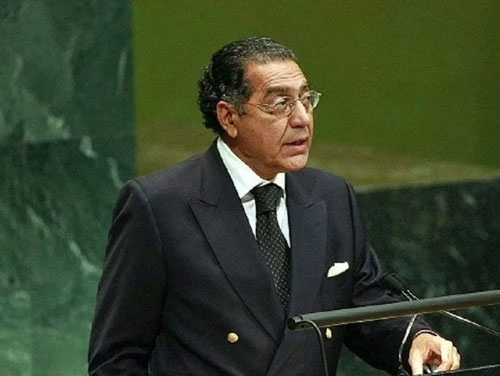Imran Yaqub Dhillon
New York
The Kashmir dispute is not just a territorial dispute. It is a dispute, which involves the people of Kashmir. It is a dispute about the soul of the people of Kashmir. Indeed, for all intents and purposes, in terms of our culture, faith, our history, our civilization, the people of Kashmir and the people of Pakistan are one and the same.
Every Pakistani has a deep sense of commitment to the cause of Kashmir”, said, Ambassador Munir Akram while speaking at the webinar titled “The rights of the Kashmiris to self –determination in the light of the UNCIP Resolution of January 5, 1949’: An appraisal” on January 8th, 2020, as a keynote speaker.
The Ambassador further stated that “We all agree on the legitimacy of the Kashmiri struggle. We all agree on the massive violations of human rights, which have taken place in Kashmir over the years and especially in the recent past.
And we also all agree on the heroism and dedication of the Kashmiri people whose third generation is keeping the spirit of resistance alive”.
Talking about Pakistan’s achievements, he said: “We have re-internationalized the Kashmir issue. For the last 15-20 years, the issue was dormant at the United Nations and in international forums.
Today it is alive again. The Security Council has considered it three times, the Human Rights Council has considered it numerous times, the Special Rapporteurs of the united nations have spoken out on several occasions, 18 special rapporteurs have jointly spoken out against the Indian atrocities in Indian crimes in Jammu and Kashmir, asked questions and asked to be asked for investigations, the High Commissioner for Human Rights itself apart from the two reports has spoken five times in the Human Rights Council on the issue of Jammu and Kashmir”.
“The most important aspect of our campaign has to be the unity of the Kashmiri people in the cause, and that is extremely important and therefore the diaspora, as well as the Kashmiris in occupied Kashmir, in Azad Kashmir, and elsewhere, all of us have to find a common ground on which to work, and which we should move forward.
And that should be a major effort on the part of our Kashmiri brothers, and whatever assistance and help that they need from the Pakistani government from the Pakistani people, we will be willing and happy to extend such assistance in unifying and keeping the unity of the Kashmiri people ”, he further added.
“It is Pakistan, which is the backbone of the Kashmiri struggle. And we must remain united.” the Ambassador concluded.
The webinar was organized by the Pakistan Mission to the United Nations commemorating the self-determination day in support of Kashmiris. Deputy Permanent Representative (DPR), Muhammad Aamir Khan moderated the session.
“The day reminds the international community, in particular the United Nations Security Council, of the imperative of honoring its commitment towards the people of Jammu & Kashmir- a solemn pledge made by the Indian leadership to the Kashmiris, Pakistan and the international community to give Kashmiris their inalienable right to self-determination”: DPR, Aamir Khan said in his opening remarks.
“ Our discussion will shed light on a range of issues such as the challenges in the way of realization of the right to self-determination for Kashmiris, India’s duplicity on Jammu and Kashmir dispute, the legality of the issue as well as massive human rights abuse and atrocities and the role of the international community in highlighting these crimes”: he added further.
Other notable speakers included Dr. Imtiaz Khan, a distinguished professor of George Washington University; Mr. Lars Rise, a well-respected Norwegian political figure; Mr. Timothy Todd Shea, an international humanitarian; Dr. Halil Toker, Chair Department of Languages at the Istanbul University and an author of a book on the history of Kashmir dispute; Ms. Victoria Schofield, a celebrated British author; Mr. Salman Khan, founder and chairman of South African Kashmiri Action group and Mr. Muzamil Ayyub Thakur, a Kashmiri, based in the UK.
Webinar panelist, Dr. Halil Toker said that: “ Erdoðan and Malaysian ex-prime minister Mahatir Muhammad declared their concerns and support to the oppressed Kashmiris. As both World leaders declared in their speeches that the intervention of the UN is a must and this must not be so difficult to the setting up of a plebiscite administration in Kashmir under the aegis of the United Nations.
Another Webinar panelist, Mr. Lars Rise said that the principle of self-determination has been applied in recent years “to the conflicts like East Timor, Bosnia, Kosovo, Southern Sudan, etc”.
“The applicability of the principle of Self-determination in the specific case of Jammu and Kashmir has been explicitly recognized by the United Nations”: he added.
Another distinguished panelist Ms. Victoria Schofield said that: “UNCIP resolution affirming the right to self-determination is one thing but to ensure its implementation is another”. “It is important to continue to highlight the situation in IIOJK particularly in relation to the human rights abuses”, she insisted.
Webinar panelist, Muzamil Ayyub Thakur, while expressing his views that: Whatever has happened in Kashmir is not ancient history, It has all happened in our lifetimes”.
“No one in Kashmir has known anything less than occupation, subjugation, oppression, the thousands dead, destruction of property and businesses in the billions of tens and thousands raped, innumerable enforced disappearances, thousands of mass and unmarked graves, human shields, torture, bullets, pellets, orphans, widows, half widows, cyber cells, media blackouts, illegal draconian laws, false Flag operations, war crimes, crimes against humanity, ethnic cleansing, genocide, demographic change, settler colonialism, fake and staged encounters. The list is endless of what the people have seen and gone through”.
Ambassador Munir Akram thanked the participants for their valuable inputs and suggestions in taking the movement for Kashmiris’ right to self-determination forward.










